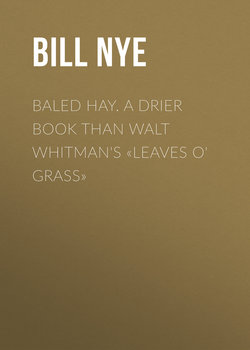Читать книгу Baled Hay. A Drier Book than Walt Whitman's «Leaves o' Grass» - Nye Bill - Страница 24
PINES FOE HIS OLD HOME
ОглавлениеTOM FAGAN, of this city, has a wild horse that don't seem to take to the rush and hurry and turmoil of a metropolis. He has been so accustomed to the glad, free air of the plains and mountains that the hampered and false life of a throbbing city, with its myriad industries, makes him nervous and unhappy. He sighs for the boundless prairie and the pure breath of the lifegiving mountain atmosphere. So taciturn is he in fact, and so cursed by homesickness and weariness of an artificial and unnatural horse society here in Laramie, that he refuses to eat anything and is gradually pining away. Sometimes he takes a light lunch out of Mr. Fagan's arm, but for days and days he utterly loathes food. He also loathes those who try to go into the stable and fondle him. He isn't apparently very much on the fondle. He don't yearn for human society, but seems to want to be by himself and think it over.
The wild horse in stories soon learns to love his master and stay by him and carry him through flood or fire, and generally knows more than the Cyclopedia Brittanica; but this horse is not the historical horse that they put into wild Arabian falsehoods. He is just a plain, unassuming wild horse of Wyoming descent, whose pedigree is slightly clouded, and who is sensitive on the question of his ancestry. All he wants is just to be let alone, and most everybody has decided that he is right. They came do that conclusion after they had soaked their persons in arnica and glued themselves together with poultices.
Perhaps, after a while, he will conclude to eat hay and grow up with the country, but now he sighs for his native bunch-grass and the buffalo wallow wherein he has heretofore made his lair. We don't wonder much, though, that a horse who has lived in the country should be a little rattled here when he finds the electric light, and bicycles, and lawn mowers, and Uncle Tom's Cabin troupes, and baled hay at $20 per ton. It makes him as wild and skittish as it does an eighteen-year-old girl the first time she comes into town, and for the first time is met by the blare of trumpets, and the oriental wealth of the circus with its deformed camels and uniformed tramps driving its miles of cages with no animals in them. The great natural world and the giddy maelstrom of seething, perspiring humanity, peculiar to the city world, are two separate and distinct existences.
